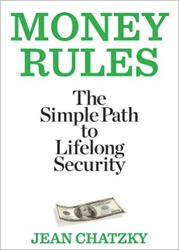Money Rules

Best introductory guide to money
I didn’t think another book on finance smarts would add anything new to the wisdom of the previously reviewed books Your Money, and Five Rituals of Wealth. But this one takes the great advice found in those and reduces it all to 100 maxims that you can read (and reread) in an hour or less. There is one simple paragraph of hard-won advice per page. This small book’s chief benefit is that busy people will actually READ it.
This is also the best money guide for young adults. I think it is perfect to start with even for elementary kids. It is less about finance and more about developing a common sense about money. Works as a refresher and reminder for adults too. I found myself in total agreement, having done well over the years using the same principles.
If you need convincing on any point, or want the details on how to execute an idea, you can delve into the aforementioned books.
12/5/12
Excerpt
The four most powerful words in any negotiation: "Can you do better?"
You're sitting in the office of the person who's dying to be your new boss. He's just offered you a job that you really want with the title you've been craving. The only hitch: The salary isn't where you'd hoped it would be. Don't commit--at least not neil you ask, "Can you do better?" It's the perfect haggle. You sound as if you know there's wiggle room, and you're willing to let him work his magic. And note: This works just as well when you're on the phone with the cable company, at the mechanic for an oil change, talking to a mortgage rep about in a "refi" rate. It even--I know from experience--works with teenage kids.
*
There's no such thing as chump change.
$100 is not a lot of money. Save it every week, however, and invest it in a retirement account where you earn a conservative 6 percent, and keep doing it for 30 years and you'll have $433,557. In 40 years, you'll have more than twice that. And that is a lot of money.
*
Saving is more important than investing.
Next time you stress about the stock market, remember this: The amount of money you manage to sock away is much more important than the return on that money. You can take my word for it. Or you can consider this eye-opening example: You save $250 a month, which you then invest. If you earn 6 percent on that money, a year from now you'll have $3,267. If you earn 10 percent, you'll have $3,311--$44 more. But what if you waited a month to start saving? Then even at 10 percent you'd have $3,052--$215 less. What if you saved $200 a month instead of $250? Then, again at 10 percent, you'd have $2,649--$618 less. As your nest-egg grows and gets into the six figure range, the return on investment starts to matter more. But you can't get to that level if you don't start to save now. Right now.
*
Your retirement trumps their tuition.
You know when you're on an airplane and they always tell you to put your oxygen mask on first before assisting a child? Saving for long-term financial needs is the same. If you don't save for your own future first, you won't be able to help your children when they need it. Worse, they may be forced to help you just when they're trying to put their own kids through school. There is no financial aid for retirement. There is plenty of financial aid for college. Don't feel guilty about this.
*
The best cost-cutting tool is a good night's sleep.
With the possible exception of prescription medication, flashlight batteries, bottled water (under the pressure of a hurricane), and a few other true necessities, there is nothing you need to buy that can't wait until tomorrow. So when you're faced with a discretionary purchase, do your wallet a favor and sleep on it. If you're not still thinking about it--whatever it happened to be--24 hours later, you didn't need or want it anyway.
*
Don't shop hungry.
This is not just a rule that applies in grocery stores. Do you know why they ply you with samples at warehouse stores? Because exciting your mouth--literally making you drool--makes you spend more money not just on food, but on everything. It primes the same part of your brain that responds to the rewards you really want. So maybe you went to the store to buy diapers but now that your brain is active, you buy the tent. (That shopping trip is legend in our family. I should tell you: we don't camp.) Oh, and when your favorite little boutique offers a special evening sale with wine and cheese? Steer clear. Alcohol not only primes the pleasure pump, it inhibits self-control.
Money Rules: The Simple Path to Lifelong Security Jean Chatzky 2012, 128 pages $11







